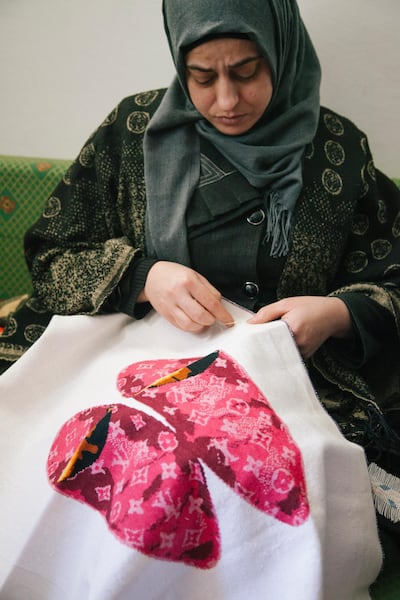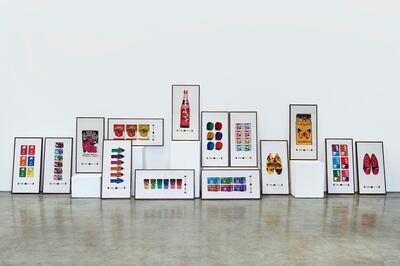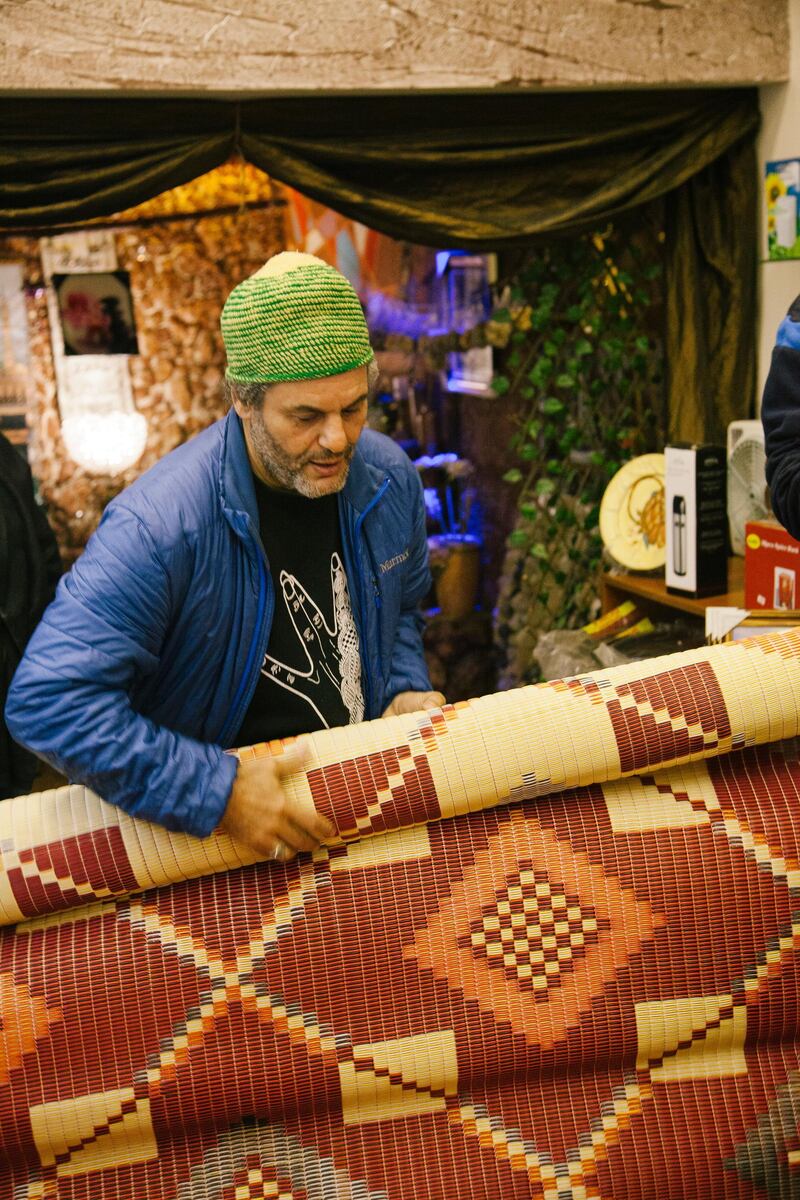Traditional tatreez, a time-honoured, centuries-old form of folk art that is passed down from mother to daughter in villages across Palestine, has always been a hallmark of the country's cultural heritage. And last week at Art Dubai, this long-lived combination of hand-embroidery and cross-stitching was given an interesting new spin.
Empowering female refugees
This was courtesy of 81 Designs, a UAE-based social enterprise founded last year by mother-daughter duo Nesrine and Nadine Maalouf. The purpose of the initiative is to empower female refugees by creating jobs based around their skill sets, through collaborations with local and regional artists. At its launch at Art Dubai last year, the brand showcased its debut collection, which featured reinterpreted works by the acclaimed Tunisian artist eL Seed, whose artworks were recreated in embroidered form by 10 Palestinian women. The result was a visually stunning and texturally interesting rendition of the artist's signature style.

This time around, five additional artisans were added to the original line-up, and 81 Designs employed these women, all of whom live at the Ain Al Hilweh Palestinian refugee camp in southern Lebanon, to make cross-stitched renditions of 14 pieces of pop art by renowned British-Moroccan artist Hassan Hajjaj.
A dream come true
Working with Hajjaj, says Nadine, has been a dream come true. "I've always been a fan of his work, since I saw him [at an art fair in Abu Dhabi] in 2006," she explains. Collaborating with artists that she admires, who have a link to the region and are willing to embrace 81 Designs' social mandate, is key to what she does. A contemporary artist, photographer, installation artist, furniture and textile designer, as well as a film director, Hajjaj is often labelled by the media as the "Andy Warhol of the Middle East", and is known for merging the realms of fine art with popular culture.
For this project, Hajjaj selected 14 favourite pieces from his ongoing body of work Graffix from the Souk, a lighthearted series that he began in the 1990s as a visual celebration of the street-level graphic art prevalent in Morocco. It includes more than 200 nostalgic images of items and products from his childhood in Marrakech, presented in a modern, playful mix of distinctive, bright colours. It was originally shot to share his background and culture with his friends in London. He handed the works over to 81 Designs, who then printed the images on large canvases, ready to be embroidered by the artisans.
Challenging the stereotypical view
It took the team of 15 women between five and six months to complete each piece. From a distance, it’s impossible to discern whether the art is a painting, a photograph, or a cross between the two. Up close, the intricacy of the embroidery becomes apparent, with the minute attention to detail resulting in an incredibly crisp rendition of the original artwork. A plaque with the name of the artisan responsible is included on each artwork, and the 45cm by 90cm pieces are priced at US $8,000 (Dh29,400). The proceeds will go to the artisans.
“We want to challenge the stereotypical view that refugees live on handouts and are charity cases,” says 81 Designs co-founder Nesrine. “We are helping them with a monthly wage so they can be sufficient and can plan for the future.”
Nadine explains further: “These women don’t have stability in their lives, and any work they can get is usually one-off. What we have given them is consistency. They don’t have to worry as much about food, health care and caring for their families. We have accomplished that thanks to artists like Hassan and eL Seed who worked with us, and we’re immensely proud of that.” The bonus, adds Nesrine, is promoting the beauty of Palestinian folk art. “By showcasing this age-old tradition in a modern medium, we can reach a larger audience and help keep the heritage of tatreez alive. So we’re able to help these talented women by giving them jobs based on something they have done for centuries, a skill only they have, and we also provide a platform for local artists.”
For London-based Hajjaj, this sort of a collaboration gives depth and meaning to his own work as an artist, and the result was much more than he could have ever expected, he says. "The result is amazing, it's overwhelming even," the artist says. "The details these ladies got into, how precise the work is, recreating the smallest details. I was so surprised. They're rock stars to me."
Meeting the women
So much so, in fact, that Hajjaj decided to visit the refugee camp and meet the ladies working on recreating his art, with the hope of including them as part of his My Rock Stars series of artwork. "Someone showed me an Instagram picture of one of the ladies embroidering and working on the art, and I felt a kind of emptiness, something was missing," he explains.
“I felt I had to go meet them. The idea was to approach them, take pictures of them, so they become the stars of the story. Plus I’d get to meet them and see how they live.”
A short film, directed by Ted Beagles and documenting the living conditions of the refugee artisans who work inside the camp, was produced as a result of the visit. It showcases Hajjaj shooting the women on a makeshift stage, dressed in colourful clothing and against a vibrant backdrop. The hope is to reproduce the images through tatreez, and have the women work on recreating the photos through embroidery, for a future collection to be launched by 81 Designs. It’s Hajjaj’s way of shining the spotlight on the women he has grown to admire.

“Visiting the camp has changed me. The warmth of the women reminded me of my aunties. It took me back, and reminded me of where I’ve come from. The camp is almost like a country within a city, and to see people living in this kind of condition puts you back in your place,” he says.
Transforming lives
Nadine is thrilled at the renewed sense of purpose that the project has afforded the artisans. “Each and every one of us has the potential to transform these women’s lives. What all these women truly want and need to live, is stability, recognition and a helping hand. They are inspiring those who have given up on themselves. They are mothers and parents, but they are game changers, too, and we can continue to change stereotypes by showing who these refugees are,” she says.
Through 81 Designs, the aim is to increase the number of the women involved, as well as to increase their salaries, over time. Maalouf is open to working with women from refugee camps anywhere; they just have to have the right skills. “Our long-term goal is to appoint as many women as possible and to start a scholarship fund for education for the arts with this social enterprise,” she says.
“Tatreez is an art – one of those forgotten arts that is always shown only on commercial goods – and we found a way to reinvent that and position it differently, to create art with it and to modernise it. And to help these women. That’s the drive in all of this.”
_________________________
Read more:
[ Deconstructed: Ironic shopping bags ]
[ The five craziest things we saw at Milan Fashion Week ]
[ Hedi Slimane will introduce menswear as new head of Céline ]
__________________________










